Practical, insightful, and eminently useful– that is how I would describe this highly readable how-to volume from a great authoring team. Maxwell, the leadership expert, brings his natural gift of encouragement and leadership genius to the mix. Parrot, a mentee of Maxwell and a psychologist, provides the illustrative stories and personality insights. In fact, it was Parrot who suggested the book to Maxwell as a potential sequel to Maxwell’s earlier book, Winning with People. 25 Ways to Win With People is the kind of book you want to refer to over and over and reread occasionally as I am doing now. It will sharpen your own people skills and help you with rich insights for teaching others.
Each chapter has an opening section from Les, about seeing the practice in action, a mentoring moment from John, and a quick outline to help the reader practice that skill. This outline has four parts; forget about, ask, do it, and remember.
In a high-quality densely packed book like this, it is hard to say such and such are the best chapters. My evaluation cannot help but be subjective, based partly on what is most helpful to my situation. But at the risk of that, I cannot help but select some chapters as my favorites.
I would start with the first three chapters, all stellar. Just practicing these three would raise most leader’s work to new levels. Chapter one is called “Start with Yourself.” I also discovered long ago that the greatest hindrances to leadership are inside the leader. So this is a must read. “Being a winner, in the purest sense,” Parrot writes, “has nothing to do with your performance…It has to do with your value and whether or not you have owned it” (p. 4). Chapter two, “Practice the 30 Second Rule,” showcases Maxwell’s touch. “All people feel better and do better when you give them attention, affirmation, and appreciation” (p. 13). Maxwell’s practice is to accomplish this in the first 30 seconds of a conversation. No wonder he is such an acclaimed leader. I met him in person just once and he encouraged me too. Chapter three urges us to, “Let People Know You Need Them.” I have observed that one of the hindrances to leadership is that people feel a need to do it all themselves. They either feel they will be recognized more or that they will do it better. What they do not comprehend is that by doing it all themselves, they are greatly limiting their own potential while at the same time marginalizing those around them and even losing the best of their workers who look for places to be better employed. John says, “Leaders can become great only when they realize that they are the ones who need people” (p. 18).
Chapter 9, “Pass the Credit on to Others” is a real highlight also. Les, in concluding the chapter, writes, “According to research, when you pass credit along to others, you actually change their biochemistry and create an emotional stamp that forever associates you in their minds with their success.” Chapter ten has good advice we are not so willing to accept, perhaps, “The average day is average only because we don’t make it something more. The most excellent way to elevate an experience is to give it our best.” The last chapter raises our sights from how do we personally learn to win to how do we “Help People Win?” The lead quote of the chapter from NBA champion, Bill Russell, is a challenge to us all. “The most important measure of how good a game I played was how much better I’d make my teammates play” (p.168).
As you can glean from just these excerpts, this is a great book. I highly recommend it.
